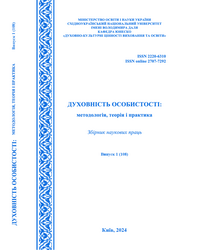FORMS AND METHODS OF EVALUATING THE RESULTS OF THE FORMATION OF OPERATIONAL AND PRACTICAL SKILLS OF STUDENTS OF SCIENTIFIC LYCEUMS (DOMESTIC AND FOREIGN FORMAT)
DOI:
https://doi.org/10.33216/2220-6310/2024-108-1-215-230Keywords:
operational and practical skills, linguistic and mathematical abilities, assessment, forms and types of assessment, students of scientific lyceums, foreign and domestic assessment formatsAbstract
The article examines the domestic and foreign experience of using forms and methods of evaluating the results of the formation of operational and practical skills of students of scientific lyceums. The expediency of using such basic types of assessment, such as: assessment of student achievements (Achievement Assessment), assessment of the process and results of the task performed by the student (Performance Assessment) has been proved), holistic assessment, assessment of student portfolios (Portfolio Assessment), external independent assessment, which has a foreign counterpart to the Standardized Achievement Test. It was established that, regardless of the universal nature of the forms and methods of evaluating the results of educational achievements, in each country this process is characterized by its own peculiarities and the influence of national educational traditions.
It has been proved that when evaluating different types of educational achievements of students, the following factors must be taken into account: quality of knowledge (systematicity, depth, meaningfulness, strength, flexibility); characteristics of students' answers (completeness, logic, reasonableness, correctness); the degree of formation of basic and subject skills; level of mental operational skills (analysis, synthesis, comparison, abstraction, classification, generalization, formulation of conclusions); experience of creative activity (ability to identify a problem and solve it, formulation of a hypothesis and independence of evaluative judgments).
The requirements for assessing the level of development of research operational and practical skills of students of domestic scientific lyceums are considered using the example of learning a foreign language (English), which serves as the main means of forming foreign language communicative competence and is a subject of the humanitarian cycle, and subjects of the school mathematics course (algebra and geometry), which is the basis for the formation of the logic of judgments, creative and critical thinking, as these two subjects of the school curriculum play a key role in all types of research work of students studying in scientific educational institutions.
It was determined that the assessment of the level of formation of such types of research skills of students is carried out based on the results of checking their educational achievements in the form of individual, group, frontal survey a5nd in the process of independent, control, thematic, project work and testing. At the same time, the educational institution can use, at its discretion, other forms of assessment of students' educational achievements, along with traditional ones.

